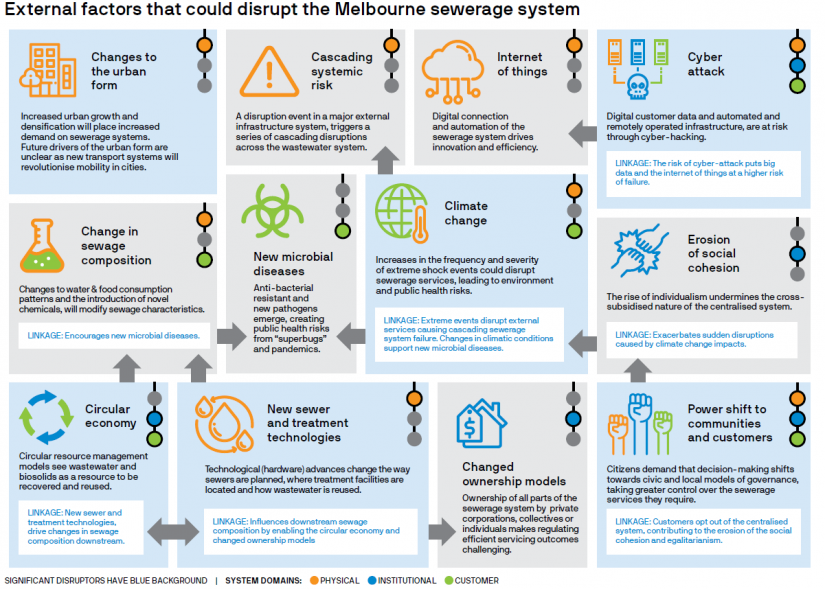The planned future of urban wastewater could transform the way in which the world consumes one of our essential resources.
However, change which affects the world is swift.
The time utilities spend developing a plan for the future is wasted unless they prepare for the potential of disruption to derail these plans.

This is especially important in the case of the Melbourne Sewerage Strategy – a 50 year strategy for sewerage management in the City of Melbourne. Assuming the state of the city will stay the same for the next half-century is naïve and potentially harmful.
ISF Research Director Pierre Mukheibir recently presented at OzWater 2018 on potential megatrends and disruptors within the water sector, examining the impact that these external factors could have on the Strategy.
Some of these trends are immediately obvious – with Melbourne’s population projected to grow to 8 million by 2050, increased demand on existing sewerage systems and the potential for major disruptive events to impact on these systems is easy to see. Similarly, the potential disruptions to the water sector caused by climate change are familiar to most.
However, some of these influences such as changing business models or currently undeveloped technologies, which potentially could have a far greater impact than the obvious, are not immediately evident.
Therefore, a process was put in place by ISF's research team, which included Associate Professor Mukheibir, Associate Professor Simon Fane, Associate Professor Joanne Chong and Emily Prentice, to first identify the future influences that may create significant changes specific to Melbourne’s sewerage system, and then to prioritise the potential of this impact based on three domains – physical infrastructure, institutions and governance, and impact on customers.
Potential influences can be seen as opportunities to improve the sector, such as implementing circular economy models or Internet of Things technology, disruptions with significant negative impacts such as unidentified microbal diseases or cascading systemic risk, or influences with potential benefits and detriments, such as changes to the form of urban areas and the composition of sewage, changed ownership models and power shifts towards communities and customers.
The disruptors identified as requiring further exploration and understanding at present, due to their potential to create damaging risks include the growing impacts of climate change, cyber-attacks to wastewater systems, and a power shift towards communities and customers.
Interestingly, this power shift towards communities and customers was also identified as a perceived opportunity to create benefits to sewerage systems, alongside the development of new wastewater technologies and changes to urban form, and a move towards circular economy models under situations created by resource scarcity.
Identifying these potential disruptors and their realms of influence will prove to be vital in the development of adaptive pathways for the future of Melbourne’s wastewater policies and strategies.
By considering the potential impact of these influences, Melbourne’s sewerage system can be prepared for a wide range of potential futures, and can continue its role in supporting healthy, thriving communities, and a flourishing, sustainable environment.

